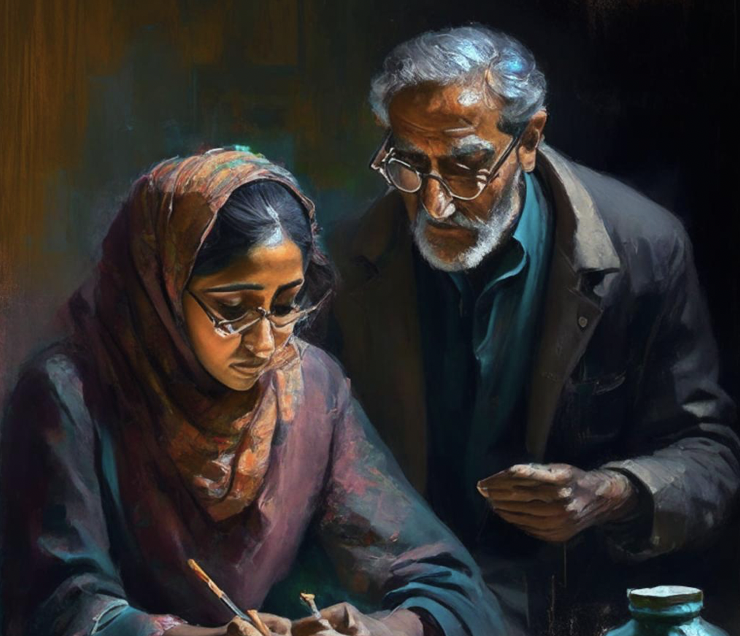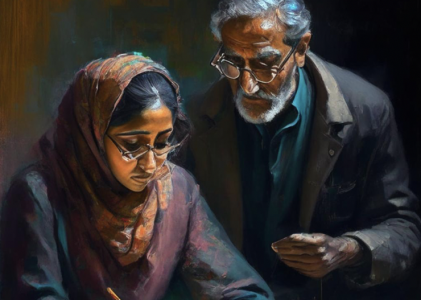Muneera A Rasheed and Babar S. Hasan
A human-centred mentorship approach to nurture emerging global health leaders has been recommended for diverse and equitable representation. The approach is characterized by “valuing empathy and relationship building between the mentor and the mentee built on equitable sharing of power and shedding of privilege within hierarchical structures.” In this piece (originally a paper), we shall delve into the challenges of implementing such an approach and show that mentees benefitting from the current status quo can be equally resistant to its adoption.
Given its nature of being an interpersonal endeavour, the human-centred mentorship process is a complex array of responsibilities that requires continuous symbiotic collaboration between mentor and mentee. It also requires a deeper holistic focus on the individual with mentee development (personal and professional) being the outcome. Hence, when viewed as a developmental relationship, the “reciprocity” of mentee to the mentor’s investment becomes instrumental for the success of the relationship. Attributes of the mentee that add to the success of the relationship include open-mindedness towards their mentor, institution and new ideas, flexibility or adapting to change when presented with new situation and ideas, willingness to listen to feedback and perseverance. In short, to be “mentorable”, one needs to be willing to be vulnerable to truly change and learn.
…to be “mentorable”, one needs to be willing to be vulnerable to truly change and learn.
The choice of being vulnerable can be influenced by individual human experiences; personality traits, for example, motivation; and cultural factors including those of academic institutions, for example, the distribution of power.
In this piece, we provide a nuanced perspective of these challenges from working in global health in Pakistan. We believe, though, that it can be applicable to settings where research governance is weak, allowing individuals in power to get away with ineffective and at times detrimental practices.

In Pakistan, there are several challenges to human-centred mentoring where respect is driven through authority discouraging vulnerability, a vital element for empathetic relationships. Moreover, to demonstrate empathy, that is, being open to other perspectives, requires the ability to simultaneously hold two perspectives: one’s own and that of the others. The ability may come naturally to some mentors, but it is a skill that has to be nurtured and learnt. Additionally, a lack of understanding of these needs is the reason behind the non-existence of training programmes to address them. Another main challenge which does not receive much attention is the unavailability of skilled mentorable human resources. Lack of skilled research staff is predominantly due to lack of investment in developing local research capacity, leaving us reliant on external funding opportunities. Consequently, the priority is to recruit staff who can communicate in English but not necessarily with rigorous training in research. This creates premature opportunities of progress for individuals who are not ready yet with the prerequisite skills expertise to lead research studies and programmes. Moreover, the hierarchical culture in Pakistan rewards social privilege, creating power asymmetries in access to opportunities manifesting in partiality instead of meritocracy. This same social hierarchy in a way is a disservice to those it promotes as in the vacuum of not challenging power, they also fail to grow and learn.
There are several challenges to human-centred mentoring where respect is driven through authority discouraging vulnerability.
The high demand due to scarcity of skilled personnel, low to minimal competition for high performance and premature rewarding by powerful mentors makes it harder for these mentees to be open to feedback and to act on it, especially when it requires intellectual effort. This hampers the readiness to be vulnerable to learn, a vital element for a mentoring relationship to be formed. The privilege and power of the mentor may facilitate openness to new ideas or feedback, but such individuals may not have the time to nurture and in fact use their influence to reward the mentees beyond their intellectual effort. Consequentially, an ineffective mentorship system has been created where mentees benefit due to their privilege not realising that these benefits have short-term value and create dependence on the mentor for future opportunities. When not presented with opportunities that are challenging, mentees fail to develop to their full potential.
Based on our experiences, we realized that taking such an initiative may not always be welcome as it can be seen as a threat to existing power hierarchies. However, we do hope that there are investigators who do wish to implement human-centred practices as an alternative approach. We have drafted a set of guidelines for them to help them navigate the challenges. We believe that a transformative mentorship relationship which is anchored in trust, respect, meaningful relationships, and problem sharing, with due responsibilities for both mentors and mentees can help create willingness in mentees to be trained as individuals ready to take on an independent path. The approach may not always work or align with the mentee’s expectations, but it should not be a reason to avoid doing the right thing. Pivoting the approach in honest relationships with team members with due emphasis on value system can also be seen as a form of self-care. However, as discussed,for the approach to be effective, the role of mentees is as important. A shift is required in the perception of the mentee’s role from “passive individual” to an active adult contributor who is aware of the power dynamics in their institution. And to an invididual who – when have the autonomy to take a decision – chooses to be on the right side.
…the hierarchical culture in Pakistan rewards social privilege, creating power asymmetries in access to opportunities manifesting in partiality instead of meritocracy.
Informed by our personal successes and failures, we have concluded that a handful of intrinsically driven individuals in a community that values protection of status quo, unfortunately may not be able to bring about a sustainable change. We also realise that taking the path to being independent is longer and harder where achievements have to be earned and are not gifted. This may not be attractive enough in a culture that readily glorifies titles but not quality of work. The pressure to conform is also real, and individuals wanting change will always be in a minority with effects on their professional and emotional health. While the current western model of academia entails elements that are useful, it is largely driven by and for power and privilege. There are mentorship approaches from other cultures that can significantly contribute towards strengthening the current model. An example is the Gurukul system of education in India, dating back centuries and embedded in core values of fraternity, discipline and humanity. This example presents an opportunity to recognize and benefit from “other” forms of knowledge to redefine mentorship, for example, by Shams Tabrizi, a Persian poet: Don’t confuse power-driven, self-centered people with true mentors. A genuine spiritual master will not direct your attention to himself or herself and will not expect absolute obedience or utter admiration from you, but instead will help you to appreciate and admire your inner self.” We hope such mentoring models can inspire mentees who are willing to take the courage to not conform. That may be a step towards creating a black swan moment rather than waiting for it.
Muneera A Rasheed and Babar S. Hasan are both global health researchers, they tweet @muneera_rasheed and @DrBabarHasan. This article is the second piece on reflections on mentorship in Global Health. Readers interested in the first piece can find it here.
If you liked this, you might also like;
